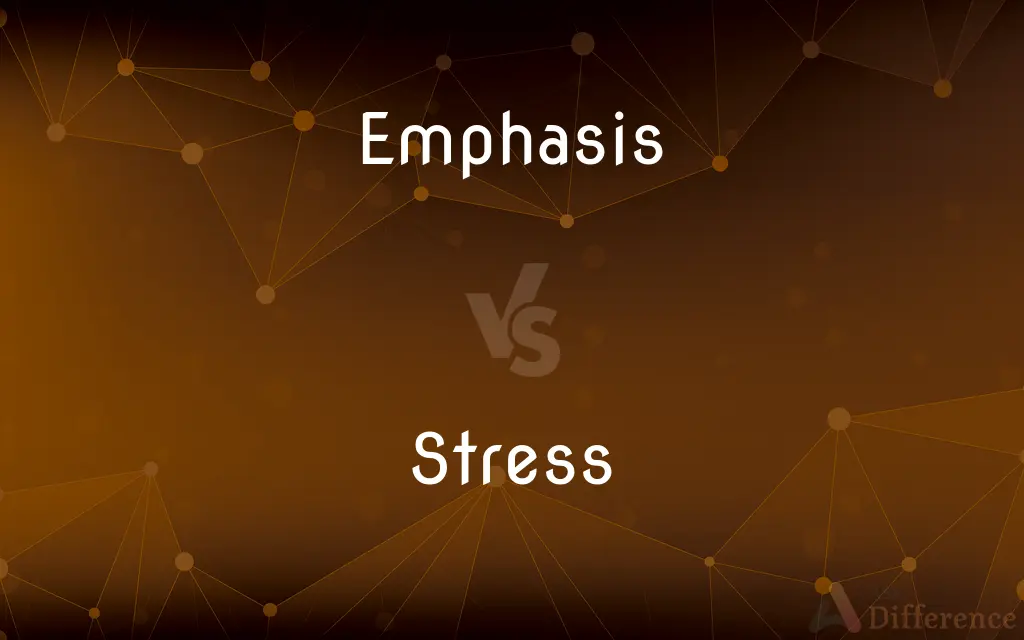Emphasis vs. Stress — What's the Difference?
By Tayyaba Rehman & Maham Liaqat — Updated on April 3, 2024
Emphasis places importance on specific words or phrases to convey meaning, while stress refers to the pronunciation of syllables to affect word meaning.

Difference Between Emphasis and Stress
Table of Contents
ADVERTISEMENT
Key Differences
Emphasis is a linguistic and rhetorical device used to highlight key parts of a sentence for clarity or persuasion, often through tone, volume, or pause. It can alter the message's interpretation, stressing importance or emotion. On the other hand, stress in linguistics primarily deals with the way syllables are pronounced, affecting the word's meaning and sometimes its grammatical function.
While emphasis modifies the delivery of sentences or phrases to underscore significance or emotion, stress is a phonological feature that distinguishes syllables within words to clarify meaning or grammatical function. Both play critical roles in effective communication but operate on different aspects of language usage.
Emphasis can be applied to any part of a sentence and can change the perceived importance or meaning of the sentence or phrase, depending on the context and delivery. Stress, however, is inherent to the pronunciation of specific words and is guided by linguistic rules that vary from language to language, making it a more fixed attribute than emphasis.
Comparison Chart
Function
Highlights importance or emotion in language
Distinguishes syllable pronunciation for meaning
Application
Can be used on words or phrases
Applied to syllables within words
ADVERTISEMENT
Significance
Affects interpretation and perceived importance
Influences word meaning and grammatical function
Manifestation in Writing
Italics, bold, underlining, etc.
Indicated through phonetic guides or context clues
Role in Communication
Enhances clarity, persuasion, and emotional impact
Essential for correct pronunciation and understanding
Compare with Definitions
Emphasis
Stress significance.
His emphasis on honesty underscored his values.
Stress
Affects pronunciation.
Incorrect stress placement can change the meaning of words.
Emphasis
Highlighting importance.
To convey her frustration, she put emphasis on finally when she said, He finally cleaned his room.
Stress
Phonetic emphasis.
The stress on the second syllable of record distinguishes its noun form from its verb form.
Emphasis
Rhetorical device.
The speaker used emphasis on key terms to captivate the audience.
Stress
Meaning differentiation.
Stress differences can indicate grammatical categories like noun vs. verb.
Emphasis
Alteration in delivery.
The teacher’s emphasis on the word must made the instruction clear.
Stress
Inherent to words.
Stress patterns in English are not always predictable.
Emphasis
Typographical indication.
The use of bold text for emphasis is common in written documents.
Stress
Syllable focus.
In English, stress can be predictive of syllable duration.
Emphasis
Special forcefulness of expression that gives importance to something singled out; stress
A lecture on housekeeping with emphasis on neatness.
Paused for emphasis, then announced the winner's name.
Stress
Pressure or tension exerted on a material object
The distribution of stress is uniform across the bar
Emphasis
Special attention or effort directed toward something
A small-town newspaper's emphasis on local affairs.
Stress
A state of mental or emotional strain or tension resulting from adverse or demanding circumstances
He's obviously under a lot of stress
Stress-related illnesses
Emphasis
Prominence given to a syllable, word, or words, as by raising the voice or printing in italic type.
Stress
Physiological disturbance or damage caused to an organism by adverse circumstances
In many areas irrigation is warranted to avoid plant stress
Emphasis
Special weight or forcefulness given to something considered important.
He paused for emphasis before saying who had won.
Stress
Particular emphasis or importance
He has started to lay greater stress on the government's role in industry
Emphasis
Special attention or prominence given to something.
Anglia TV's emphasis is on Norwich and district.
Put emphasis on the advantages rather than the drawbacks
Stress
Give particular emphasis or importance to (a point, statement, or idea) made in speech or writing
They stressed the need for reform
‘I want it done very, very neatly,’ she stressed
She was anxious to stress that her daughter's safety was her only concern
Emphasis
Prominence given to a syllable or words, by raising the voice or printing in italic or underlined type.
He used a yellow highlighter to indicate where to give emphasis in his speech.
Stress
Subject to pressure or tension
This type of workout does stress the shoulder and knee joints
Emphasis
(phonology) The phonetic or phonological feature that distinguishes emphatic consonants from other consonants.
Stress
Cause mental or emotional strain or tension in
I avoid many of the things that used to stress me before
Emphasis
(typography) The use of boldface, italics, or other such formatting to highlight text. en
Stress
Importance, significance, or emphasis placed on something.
Emphasis
A particular stress of utterance, or force of voice, given in reading and speaking to one or more words whose signification the speaker intends to impress specially upon his audience.
The province of emphasis is so much more important than accent, that the customary seat of the latter is changed, when the claims of emphasis require it.
Stress
The relative force with which a sound or syllable is spoken.
Emphasis
A peculiar impressiveness of expression or weight of thought; vivid representation, enforcing assent; as, to dwell on a subject with great emphasis.
External objects stand before us . . . in all the life and emphasis of extension, figure, and color.
Stress
The emphasis placed on the sound or syllable spoken most forcefully in a word or phrase.
Emphasis
A special attention given to, or extra importance attached to, something; as, a guided tour of Egypt with emphasis on the monuments along the Nile.
Stress
The relative force of sound or emphasis given a syllable or word in accordance with a metrical pattern.
Emphasis
Something to which great importance is attached; as, the need for increased spending on education was the emphasis of his speech.
Stress
A syllable having strong relative emphasis in a metrical pattern.
Emphasis
Special importance or significance;
The red light gave the central figure increased emphasis
The room was decorated in shades of gray with distinctive red accents
Stress
An accent or mark representing such emphasis or force.
Emphasis
Intensity or forcefulness of expression;
The vehemence of his denial
His emphasis on civil rights
Stress
The internal distribution of force per unit area within a body subject to an applied force or system of forces.
Emphasis
Special and significant stress by means of position or repetition e.g.
Stress
The internal resistance of a body to such an applied force or system of forces.
Emphasis
The relative prominence of a syllable or musical note (especially with regard to stress or pitch);
He put the stress on the wrong syllable
Stress
A condition of extreme difficulty, pressure, or strain
"He presided over the economy during the period of its greatest stress and danger" (Robert J. Samuelson).
Stress
A condition of physiological or psychological disturbance to the normal functioning or well-being of an organism, occurring as a response to any of various environmental or psychosocial stimuli. Signs and symptoms of stress in humans include increased blood pressure, insomnia, and irritability.
Stress
A stimulus or circumstance causing such a condition
Couldn't stand the stresses of the job and quit.
Stress
To place emphasis on
Stressed basic fire safety in her talk.
Stress
To give prominence of sound to (a syllable or word) in pronouncing or in accordance with a metrical pattern.
Stress
To subject to mechanical pressure or force.
Stress
To undergo physiological or mental stress, as from working too much. Often used with out.
Stress
(biology) A physical, chemical, infective agent aggressing an organism.
Stress
(biology) Aggression toward an organism resulting in a response in an attempt to restore previous conditions.
Stress
The internal distribution of force across a small boundary per unit area of that boundary (pressure) within a body. It causes strain or deformation and is typically symbolised by σ or τ.
Stress
Force externally applied to a body which cause internal stress within the body.
Stress
(uncountable) Emotional pressure suffered by a human being or other animal.
Go easy on him, he's been under a lot of stress lately.
Stress
A suprasegmental feature of a language having additional attention raised to a sound, word or word group by means of of loudness, duration or pitch; phonological prominence.
Some people put the stress on the first syllable of “controversy”; others put it on the second.
Stress
The suprasegmental feature of a language having additional attention raised to a sound by means of of loudness and/or duration; phonological prominence phonetically achieved by means of dynamics as distinct from pitch.
Stress
(uncountable) Emphasis placed on a particular point in an argument or discussion (whether spoken or written).
Stress
Obsolete form of distress
Stress
Distress; the act of distraining; also, the thing distrained.
Stress
(transitive) To apply force to (a body or structure) causing strain.
Stress
(transitive) To apply emotional pressure to (a person or animal).
Stress
To suffer stress; to worry or be agitated.
Stress
(transitive) To emphasise (a syllable of a word).
“Emphasis” is stressed on the first syllable, but “emphatic” is stressed on the second.
Stress
(transitive) To emphasise (words in speaking).
Stress
(transitive) To emphasise (a point) in an argument or discussion.
I must stress that this information is given in strict confidence.
Stress
Distress.
Sad hersal of his heavy stress.
Stress
Pressure, strain; - used chiefly of immaterial things; except in mechanics; hence, urgency; importance; weight; significance.
The faculties of the mind are improved by exercise, yet they must not be put to a stress beyond their strength.
A body may as well lay too little as too much stress upon a dream.
Stress
The force, or combination of forces, which produces a strain; force exerted in any direction or manner between contiguous bodies, or parts of bodies, and taking specific names according to its direction, or mode of action, as thrust or pressure, pull or tension, shear or tangential stress.
Stress is the mutual action between portions of matter.
Stress
Force of utterance expended upon words or syllables. Stress is in English the chief element in accent and is one of the most important in emphasis. See Guide to pronunciation, 31-35.
Stress
Distress; the act of distraining; also, the thing distrained.
Stress
To press; to urge; to distress; to put to difficulties.
Stress
To subject to stress, pressure, or strain.
Stress
To subject to phonetic stress; to accent.
Stress
To place emphasis on; to make emphatic; emphasize.
Stress
The relative prominence of a syllable or musical note (especially with regard to stress or pitch);
He put the stress on the wrong syllable
Stress
(psychology) a state of mental or emotional strain or suspense;
He suffered from fatigue and emotional tension
Stress is a vasoconstrictor
Stress
(physics) force that produces strain on a physical body;
The intensity of stress is expressed in units of force divided by units of area
Stress
Special emphasis attached to something;
The stress was more on accuracy than on speed
Stress
Difficulty that causes worry or emotional tension;
She endured the stresses and strains of life
He presided over the economy during the period of the greatest stress and danger
Stress
To stress, single out as important;
Dr. Jones emphasizes exercise in addition to a change in diet
Stress
Put stress on; utter with an accent;
In Farsi, you accent the last syllable of each word
Stress
Test the limits of;
You are trying my patience!
Common Curiosities
Can emphasis change the meaning of a sentence?
Yes, by emphasizing different words or phrases, the perceived importance or meaning of the sentence can change.
Is stress important in all languages?
While not all languages use stress in the same way, many languages use stress to differentiate words or meanings.
How is emphasis shown in written language?
Through italics, bold text, underlining, and sometimes punctuation, like exclamation points.
Can the absence of emphasis affect communication?
Yes, lack of emphasis can lead to misunderstandings or understate the importance of key information.
Are there rules for applying stress in English?
Yes, there are patterns and rules, though there are exceptions that often confuse learners.
Can emphasis and stress be used together?
Yes, in spoken language, emphasis and stress can be combined for clearer communication.
What is emphasis in language?
Emphasis is a way to highlight important parts of a sentence for clarity or emotional effect.
How does stress affect word meaning?
Stress affects the meaning of words by emphasizing certain syllables over others, which can change a word's function or meaning.
How do emphasis and stress contribute to effective communication?
They enhance clarity, ensure correct interpretation, and can convey emotional nuance.
Can emphasis be visually represented beyond text formatting?
Yes, through non-verbal cues like gestures or changes in facial expression during face-to-face communication.
Does stress always change a word’s grammatical function?
Not always, but in many cases, stressing different syllables can change a word from a noun to a verb, for example.
How does stress differ in languages other than English?
Stress patterns can vary greatly, with some languages using fixed stress locations and others being more flexible.
Why is understanding emphasis and stress important for language learners?
It aids in both accurate pronunciation and in understanding subtle meaning changes in communication.
Can changing emphasis alter a word's stress pattern?
Typically, emphasis affects sentence level meaning rather than changing a word’s inherent stress pattern.
What tools can help identify stress in words?
Dictionaries often use phonetic symbols to indicate stress patterns in their word entries.
Share Your Discovery

Previous Comparison
Sky vs. Ski
Next Comparison
Tillage vs. TilthAuthor Spotlight
Written by
Tayyaba RehmanTayyaba Rehman is a distinguished writer, currently serving as a primary contributor to askdifference.com. As a researcher in semantics and etymology, Tayyaba's passion for the complexity of languages and their distinctions has found a perfect home on the platform. Tayyaba delves into the intricacies of language, distinguishing between commonly confused words and phrases, thereby providing clarity for readers worldwide.
Co-written by
Maham Liaqat













































